Robinsons Malls champions sustainability by going clean & green
With the impact of climate change too real to ignore, everyone has become more conscious of their own carbon footprint, as well as the sustainability of the goods and services they consume or patronize.
This growing market clamoring for businesses to be more responsible in reducing pollution and consumption of water and energy will feel at home at Robinsons Malls, which has put sustainability at the at the top of its priorities for both future and existing developments. At the forefront of Robinsons Malls’ efforts to go green is its commitment to making sustainable living more accessible to Filipinos.
“It’s easier to make smarter choices with regard to the environment and one’s lifestyle when eco-friendly solutions are more accessible,” says Robinsons Land Corporation (RLC) Senior Vice President and Robinsons Malls General Manager Arlene Magtibay.
“We want to make sure that our efforts are in line with that, and we want to bring those options for sustainable living to our customers,” she added.
At the heart of its sustainability program is the use of clean renewable energy sources, the installation of water conservation and recycling facilities, the incorporation of energy-saving features in the design of the malls, and solid waste management systems.
Robinsons Malls leads the country in the installation of its own solar panels to replace power sourced from the grid with green and renewable energy. While it holds the record for the world’s largest rooftop solar power installation through Robinsons Starmills, RLC continues to intensify its commitment to a sustainable future by aiming to make all its malls use clean energy.
Robinsons Starmills’ 2.88-megawatt roof-based solar power plant alone is responsible for cutting carbon dioxide emissions by 2,400 MT every year. This is equivalent to doing the work of 40,000 trees in reducing carbon dioxide in the air.
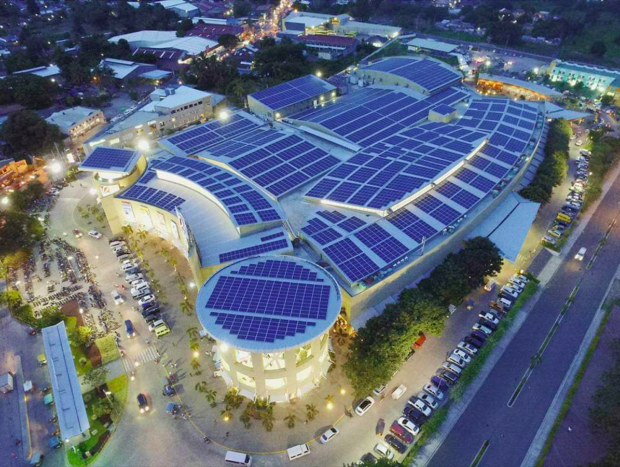
Robinsons Place Dumaguete’s 1.57 MW roof-based solar power plant cuts carbon dioxide emissions by 1,000 MT yearly.
To date, 24 Robinsons Malls are harnessing solar power with a total capacity of about 31 megawatts nationwide. This impressive feat allows Robinsons Malls to generate 110 million kilowatt-hours of clean energy and eliminate over 78,000 MT of carbon dioxide from the environment. This level of carbon dioxide reduction is equivalent to planting around one million trees around the country.
“We are continuously and actively looking for ways to adopt sustainability in all areas of our businesses. RLC’s move to make our malls energy self-sufficient through solar power is one of the many ways by which we are harnessing renewable energy sources to reduce our carbon footprint,” said RLC President and CEO Frederick Go.
Aside from clean energy sources, RLC ensured that its projects are designed and constructed to be as sustainable and energy-efficient as possible. Efforts include implementing efficient construction waste management, using recycled building materials, and employing water-efficient landscaping.
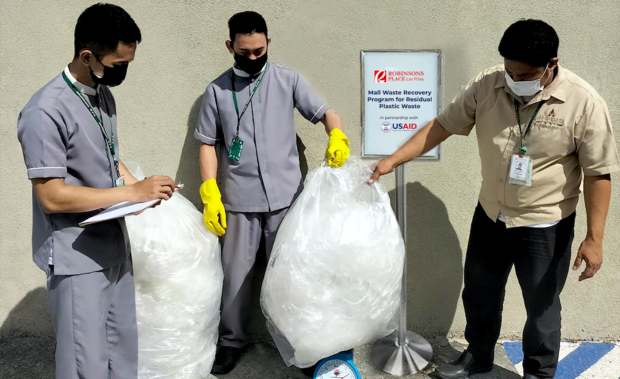
USAID-assisted mall waste recovery program for residual plastic waste project at Robinsons Place Las Pinas.
Furthermore, Robinsons Malls optimizes energy consumption and resources within its malls to ensure that day-to-day operations do not harm the environment. To maximize natural daytime lighting, most Robinsons malls are fitted with skylights, clerestory windows, and LED lights that siginificantly decrease energy consumption. Even air conditioning systems are guaranteed ozone-friendly.
RLC is likewise committed to reducing the amount of wastewater discharged to public sewers. Robinsons Malls are equipped with rainwater collection system or wastewater treatment and recycling plant. Recycled wastewater is used for flushing toilets and gardening, reducing sewage discharge to public sewers. Robinsons Malls also cuts down on water usage through its water-saving fixtures in mall restrooms.
In collaboration with the United States Agency for International Development (USAID), a successful solid waste segregation system is also being implemented among Robinsons mall tenants. The program aims to reduce harmful plastic waste by upcycling the recovered residual plastics into various products.
On top of this, Robinsons Malls spearheads other community recycling efforts, including the Robinsons Malls Weekend Recycling Market and Bottles-to-Soil Program. The recycling market is a recyclable-buying event that includes Robinsons’ tenants, consumers, other commercial enterprises, schools, religious organizations, and city residents. By mobilizing waste management efforts that everyone can participate in, these programs create a waste recovery mechanism that benefits both people and planet.
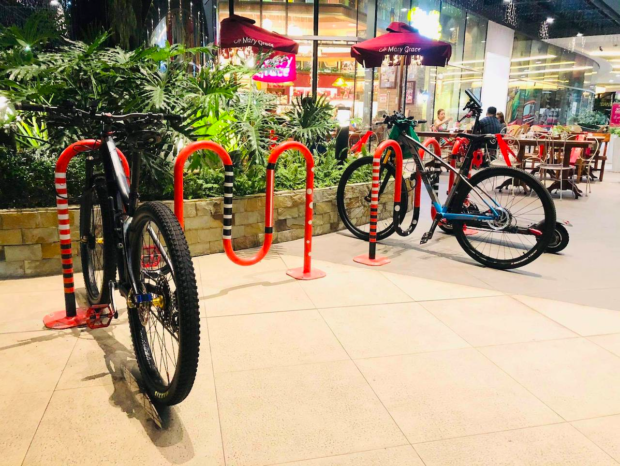
Bike Parking and Repair Stations are available in Robinsons Malls nationwide.
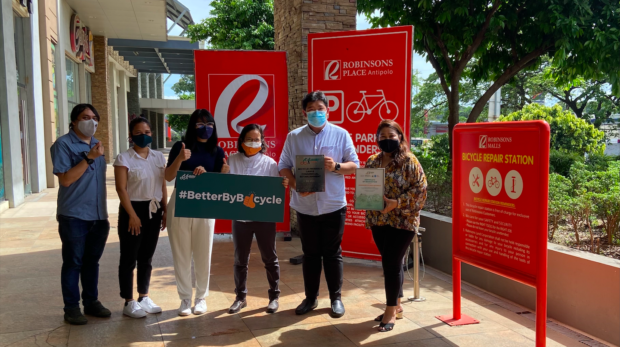
The Institute for Climate & Sustainable Cities (ICSC) named Robinsons Place Antipolo as nationwide Silver Awardee for Bicycle Friendly Establishment .
Robinsons Malls has also been promoting cycling as a reliable, efficient, and environment-friendly mode of transportation. Various programs, events, and safety policies are in place to ensure the welfare and safety of bikers. In support of this, Robinsons Malls are equipped with facilities and amenities dedicated to bikers. These include bike racks, bike repair equipment, as well as water refilling stations.
At the height of the pandemic, nine (9) Robinsons Malls won the Mobility Awards for providing facilities that encourage biking as a solution to transportation woes. The winners were selected based on the criteria for infrastructure, innovation, integration, implementation, and inclusivity in support of biking.
“Robinsons Malls has always promoted biking as an eco-friendly alternative to mobility and an ideal activity for a healthy lifestyle,” said Magtibay.
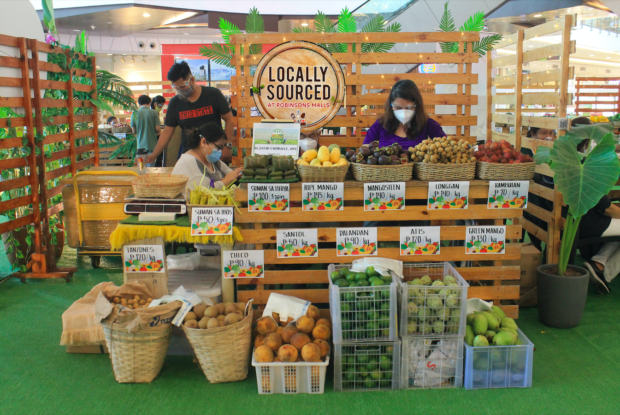
Locally Sourced, a Fresh Produce Fair supporting the livelihood of local farmers and fisherfolks, is held in over 30 Robinsons Malls
Meanwhile, through hosting green events such as the “Locally Sourced” Fresh Produce Fair, Robinsons Malls provided customers another avenue to shop for fresh, affordable, and ethically sourced agricultural products, while supporting the livelihood of local farmers and fisherfolk. “Locally Sourced” served as an opportunity for various organizations and companies to partner with Robinsons Malls in providing the public with a wider variety of sustainable products.
Currently, the project is supported by the Department of Agriculture and the Bureau of Plant Industry, as well as the “Kadiwa ni Ani at Kita” initiative, a market system promoted by the Department of Agriculture to support both Filipino households and farmers. Plants, seeds, and gardening tools for home gardening and growing are also available for customers to shop.
ADVT.